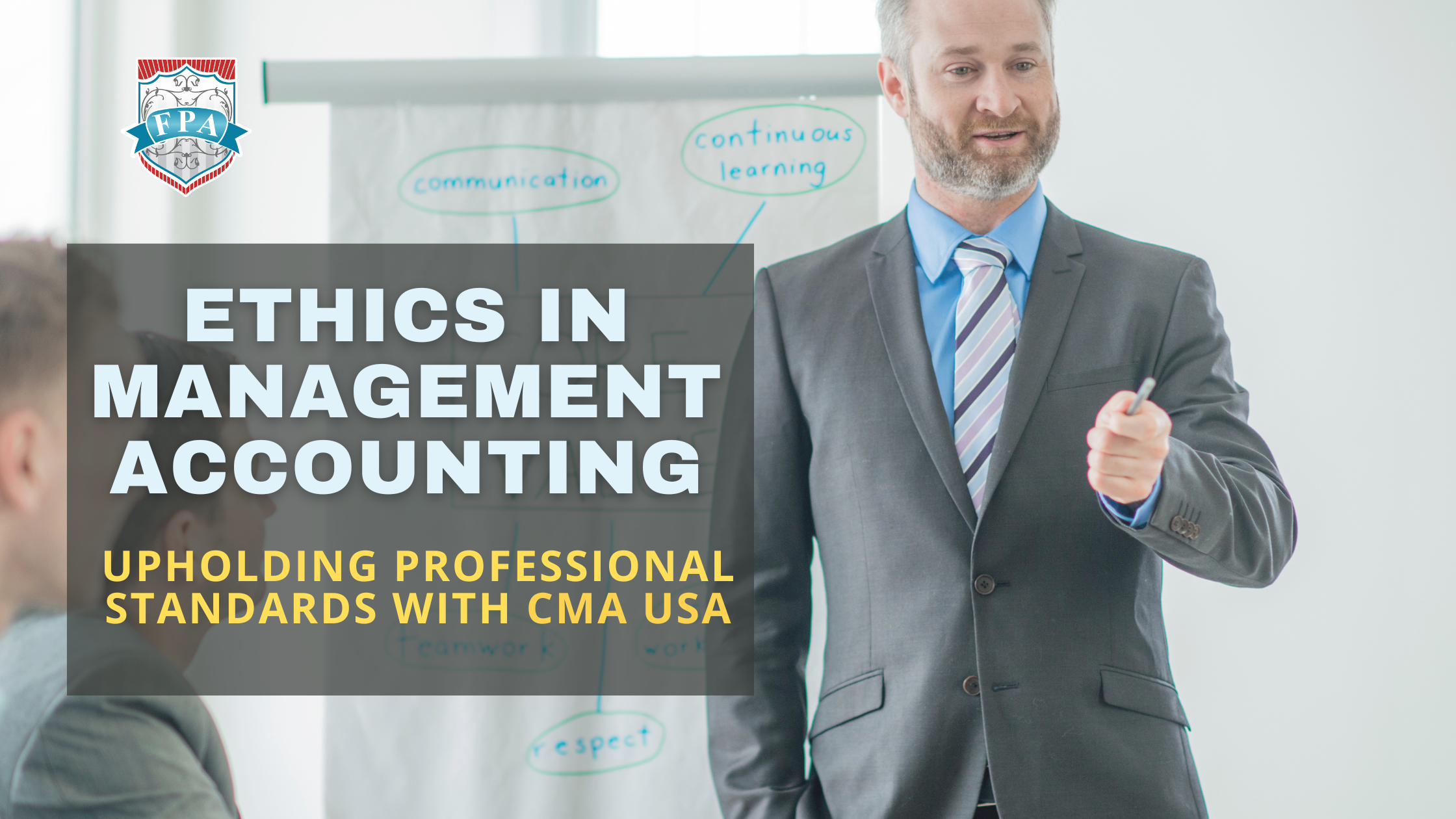Ethics is the backbone of any profession, and in the field of management accounting, it’s indispensable. The role of a Certified Management Accountant (CMA) goes beyond numbers, as CMAs often play critical roles in decision-making, financial reporting, and resource management. With their skills in budgeting, financial planning, and strategic analysis, CMAs are relied upon to deliver objective insights and uphold financial integrity. The CMA course emphasizes these ethical obligations, preparing professionals to meet the highest standards of accountability, transparency, and professional conduct. Here’s how ethics plays a crucial role in management accounting and how the CMA designation reinforces ethical standards.
- The Importance of Ethics in Management Accounting
Management accountants often handle sensitive financial information, analyze data that guides major decisions, and assess the financial health of organizations. Any misrepresentation or unethical manipulation of financial data can have severe repercussions, leading to misguided business decisions, reputational damage, and potential legal issues. In this context, ethics ensures that CMAs maintain integrity, honesty, and objectivity in their work, building trust with stakeholders and helping to safeguard the long-term stability of the organization.
By adhering to ethical principles, management accountants ensure transparency, which is essential for accurate reporting, decision-making, and maintaining stakeholder confidence.
- CMA’s Ethical Framework and Standards
The CMA course integrates ethical training as a fundamental part of its curriculum. Certified Management Accountants are required to abide by the Institute of Management Accountants (IMA) Statement of Ethical Professional Practice, which includes key ethical standards such as:
- Competence: CMAs must continuously develop and apply their knowledge and skills to ensure they provide relevant and accurate financial information.
- Confidentiality: CMAs must respect confidentiality and not disclose sensitive information without proper authority unless legally required.
- Integrity: CMAs are expected to avoid conflicts of interest, mitigate bias, and prevent any actions that could compromise their integrity.
- Credibility: CMAs must communicate information fairly and objectively, ensuring that reports and recommendations are truthful and reliable.
The adherence to these standards not only protects organizations but also bolsters the credibility and value of the CMA credential in the field of management accounting.
- Ethics as a Competitive Advantage
In today’s corporate landscape, ethical companies are often more resilient and perform better financially in the long term. Organizations that prioritize ethical financial practices attract more investors, retain loyal customers, and have lower legal risks. CMAs are at the forefront of ensuring these practices, as their role often involves creating and implementing policies that shape the ethical framework of their companies.
For CMAs, demonstrating ethical behavior is a competitive advantage, positioning them as trusted advisors within their organizations. They play an instrumental role in establishing a culture of integrity, which is critical for long-term organizational success and reputation.
- Risk Management and Ethical Decision-Making
Management accountants must navigate complex decisions with significant ethical implications, especially in areas involving financial forecasting, budgeting, and cost analysis. The CMA course prepares candidates to identify and assess risks while prioritizing ethical considerations in decision-making. CMAs are trained to recognize red flags in financial practices, evaluate ethical dilemmas, and choose courses of action that align with both corporate goals and ethical standards.
For example, in scenarios involving cost-cutting measures, a CMA must balance the financial interests of the organization with fair and ethical treatment of employees. By prioritizing transparency and objectivity, CMAs help organizations avoid decisions that may appear profitable in the short term but could have adverse ethical consequences.
- Combating Financial Misreporting and Fraud
One of the most critical aspects of a CMA’s role is detecting and preventing financial misreporting and fraud. Unethical accounting practices can lead to severe financial scandals, as seen in cases like Enron and WorldCom, where improper reporting had devastating consequences. The CMA’s ethical training helps professionals identify signs of fraud, manipulate internal controls, and maintain accurate financial records.
The CMA course instills an awareness of these responsibilities, emphasizing that even the smallest ethical compromises can lead to significant consequences. By maintaining an ethical stance, CMAs play a crucial role in preventing fraud, protecting the organization’s reputation, and upholding the integrity of financial reporting.
- Encouraging a Culture of Ethics
CMAs don’t just follow ethical guidelines; they also promote a culture of ethics within their organizations. Through their influence and positions, CMAs can advocate for policies, processes, and practices that support ethical behavior. Whether it’s encouraging transparent reporting, strengthening internal controls, or setting ethical examples for team members, CMAs are key to fostering an environment where ethical standards are valued and upheld.
A CMA who champions ethical practices can have a ripple effect throughout the organization, inspiring employees to value ethical behavior and make decisions that support the company’s integrity and mission.
- Continued Ethical Education and Adaptation
Ethics in management accounting is not static; it evolves with regulatory changes, technological advancements, and global business challenges. CMAs are committed to continuing professional education, staying updated on new regulations, standards, and ethical practices. The CMA course provides a foundation, but CMAs are expected to pursue ongoing learning, attend ethics seminars, and participate in discussions on emerging ethical issues.
This adaptability is crucial in a dynamic financial environment, where new situations—such as data privacy concerns, environmental accountability, and digital asset management—require CMAs to apply ethical standards to fresh, often complex challenges.
Conclusion
For Certified Management Accountants, ethics is more than a requirement; it’s a professional commitment that defines their role in organizations and the wider business community. The CMA course instills the ethical foundation that CMAs need to act with integrity, prevent fraud, and make responsible decisions. By upholding these ethical principles, CMAs enhance their own credibility, support the financial health of their organizations, and contribute to a culture of accountability and trust.
With the CMA’s emphasis on ethics, professionals can confidently address ethical challenges, act as role models for others, and shape financial practices that prioritize transparency and ethical standards. As ethical champions within the accounting and finance field, CMAs ensure that business decisions are both financially sound and morally responsible, laying the groundwork for sustainable growth and success.



 Summarize this Article with AI
Summarize this Article with AI


